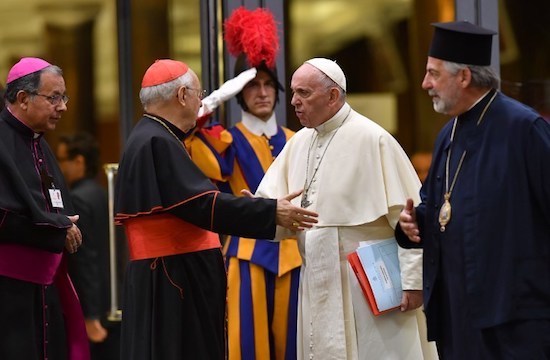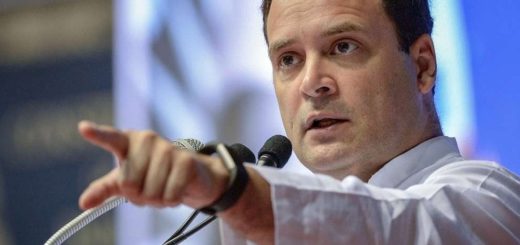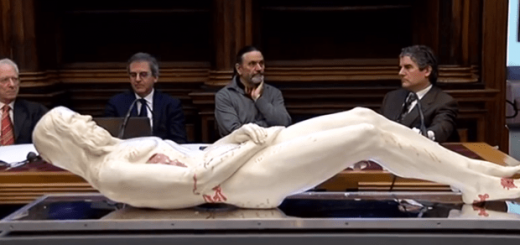Youth synod of old men!

Cover image: Pope Francis talks with Cardinal Lorenzo Baldisseri (second left) as they leave after addressing the opening of the Synod of Bishops on Oct. 3, 2018 at the Vatican. (Photo by Andreas Solaro/AFP)
LA CROIX INTERNATIONAL
Fr. Myron J. Pereira, S.J.
Mumbai, India
October 12, 2018
The Catholic Church suffers from crises on three fronts: (1) crisis over increasing youth disenchantment with the Church due mainly to not making them an integral part of decision-making (2) celibate clergy and (3) a callous attitude on the part of the Church to allow leadership roles to women – even the educated and competent ones – who are still considered second fiddle, handmaids and at best meek collaborators but certainly not co-partners. With the likelihood of more Mulakkal skeletons coming out of the cupboard, the Church, particularly the Indian Church, is in for a real battering and churning process, with hardly any takers for oft repeated sermons through Pastoral Letters. Isaac Gomes, Asso. Editor, Church Citizens' Voice..
The synod assembly on youth is being planned and discussed by senile old men. Amusing, but also tragic.
It is sometimes said that the Catholic Church today faces three crises, all of its own making.
The first is the crisis of a celibate clergy, which has exploded into the crisis of paedophile priests and a corrupt hierarchy that colluded with them.
This used to be passed off as an "American" problem — until we realized that it is global — there are priest predators in Latin America, Europe, Africa and even in India, the sexual molesters of Catholic women.
The second crisis centers on the lack of leadership roles for women in the church. At this moment, this is still largely an issue in the West, but like the recent #Metoo movement, the social media makes its momentum felt across the universal church.
Women — educated, competent and dedicated — will no longer be relegated to arranging flowers on the altar and singing in the choir. Nor will they be put off by bogus theological arguments and references to canon law. They want a significant role in the running of the church, and they want it now.
The third crisis is over the treatment of youth. This is in fact why the present synod, the 15th to be held since Vatican II, has been called: 'Young People, the Faith and Vocational Discernment'.
The pope is worried that no matter how many of the young want to take selfies with him, they just aren't interested in going to church. In fact, across Europe and in many parts of the United States, empty Catholic churches are being purchased by people of other faiths!
So, the Oct. 3-25 synod is a three-week deliberation on what young people want of the church. Note, however, that the entire deliberations will be held by senile men, aged 55 or older.
Nonetheless, Pope Francis has named some 30 women and several young adults as "collaborators" and "observers" to the synod. They will join the discussions, but will not have a vote on the final proposals given to the pope.
So, the first thing bishops need to admit is that they don't know how to evangelize their contemporaries.
The second thing they must do is to listen to people, listen to youth — especially the youth that does not go to church.
What in fact, do young people want?
Many say that they don't want religion; they want spirituality. This is more than just a question of semantics. Religion is understood as the set of all cultic practices, ethical codes and creedal definitions that religious leaders enforce upon their members, usually under threat.
'Spirituality' by contrast, is seen as a more liberating experience. It refers to an attitude, an interior discipline which is open, all-embracing and all-nurturing.
Young people are attracted to Eastern spiritualties such as yoga, Zen, Dao; and now increasingly to a 'whole earth' spirituality that inculcates a disposition of conservation, austerity and stewardship.
Take the most critical issue for young people in India today: the unemployment problem. Young men and women are angry that they cannot get the job they want, and therefore feel they have no future. What does the church say to young people like these?
The Catholic faith as it has developed in these last decades is seen as a system of moral control, and little else. It wants obedience to doctrine. But it offers no new and creative ways of being, of relating. Sad, but true.
Yet another hunger among young people today is for community, fellowship and bonding. The church does encourage community — but of a stratified, segmented kind. Each member in the church has prescribed roles and functions (with priests being always at the top), and they are all deemed to be "God-given".
But why can't women aspire to priesthood, ask young people? And why is the Catholic Church so dead against a married clergy?
Years ago, Pope St. John Paul II coined the term "the new evangelization", and Pope Benedict XVI followed him. It was a belated recognition that the world had changed and that the older forms of proclaiming the Gospel no longer held. Unfortunately, all that came out of the new evangelization was the Catechism of the Catholic Church, and nothing much beyond.
But no one was ever evangelized by a textbook. It is people, individuals, who proclaim the Gospel.
It was left to Pope Francis to show by word and example that the core of the new evangelization is compassion and mercy. And by his actions — kissing the feet of women prisoners, embracing disfigured men, letting little children run around him — he created a new image of the church, of the Gospel.
What are the major issues which grip young people today? Persistent injustice. Growing inequality. Inter-faith issues, especially regarding marriage and religious tolerance. Working for reconciliation among those who have a history of violence. And almost everywhere, care of the environment has emerged as a major challenge to young and old alike.
As all psychologists know, a crisis ('judgment' in Greek) is both a disaster and an opportunity. The 'old way' of doing things has collapsed.
One realizes that one can't continue in the same manner any longer. So, a crisis is a time of great vulnerability. The church can be hurt and hurt badly. But a crisis is also an opportunity. Can one seize the moment to do things differently, and not just survive but prevail? A crisis can also become a time of growth into something new and beautiful.
The three crises in the modern church have the capacity to re-make it in the likeness of the Gospels. May the synod (another Greek word, meaning "walking together") lead us together to where God wishes us to be.
Father Myron Pereira SJ is a media consultant based in Mumbai.

















